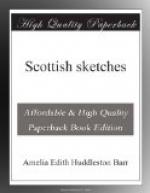“I don’t think so,” said Tallisker stoutly. “Mountains are naething to men. How small is Sinai when the man Moses stands upon it!”
Then they were at the Keep garden. Helen pulled a handful of white and golden asters, and the laird, who had seen them coming, opened the door wide to welcome them. Alas! Alas! Though he saw it not, death entered with them. At midnight there was the old, old cry of despair and anguish, the hurrying for help, where no help was of avail, the desolation of a terror creeping hour by hour closer to the hearthstone.
The laird was stricken with a stony grief which was deaf to all consolation. He wandered up and down wringing his hands, and crying out at intervals like a man in mortal agony. Helen lay in a stupor while the fever burned her young life away. She muttered constantly the word “Colin;” and Tallisker, though he had no hope that Colin would ever reach his sister, wrote for the young laird.
Just before the last she became clearly, almost radiantly conscious. She would be alone with her father, and the old man, struggling bravely with his grief, knelt down beside her. She whispered to him that there was a paper in the jewel-box on her table. He went and got it. It was a tiny scrap folded crosswise. “Read it, father, when I am beyond all pain and grief. I shall trust you, dear.” He could only bow his head upon her hands and weep.
“Tallisker!” she whispered, and he rose softly and called him. The two men stood together by her side.
“Is it well, my daughter?” said the dominie, with a tone of tender triumph in his voice. “You fear not, Helen, the bonds of death?”
“I trust in those pierced hands which have broken the bonds of death. Oh! the unspeakable riches!”
These were her last words. Tallisker prayed softly as the mystical gray shadow stole over the fair, tranquil face. It was soon all over.
“She had outsoared the shadow of
our night,
And that unrest which men misname delight.”
The bridal robes were folded away, the bridegroom went back to his regiment, the heartsore father tried to take up his life again. But it seemed to him to have been broken in two by the blow; and besides this, there was a little strip of paper which lay like a load upon his heart. It was the paper he had taken from Helen’s dying fingers, and it contained her last request:
“Father, dear, dear father, whatever you intended to give me—I pray you—give it to God’s poor.
“Helen.”




